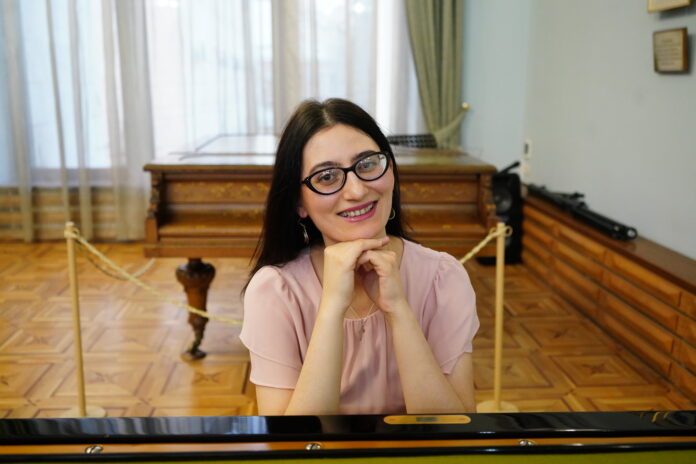YEREVAN — This past February, the 16th “Armenian Composing Art Festival,” organized by the Armenian State Symphony Orchestra, took place in Yerevan. During its second concert, on February 17, a piece by young composer Arpine Kalinina from Yerevan, Impatience of the Heart, was premiered.
Kalinina graduated from the Yerevan Komitas State Conservatory, specializing in composition (under Professor Levon Chaushyan) and piano (under Professor Maro Ghazaryan). She then pursued a master’s degree in composition at the Royal Academy of Music in London, studying under Professors Gary Carpenter and Paul Patterson. She is the author of vocal-instrumental, chamber, and orchestral works that have been performed in Armenia and abroad. As a composer, she has received national and international awards, including the “Triumph” Prize for outstanding achievements in the field of arts in the Russian Federation (Moscow, 2010) and a certificate for reaching the final round of the Bartók World Competition for String Quartets (Budapest, 2020).
Her activities are multifaceted. In 2007, she founded and led the Kantegh (Lantern) Ensemble of Armenian Classical Music as its artistic director and pianist until 2021. She has initiated and implemented intercultural concert projects, such as the British-Armenian Musical Bridge concert series (Yerevan-London, ongoing since 2017) and the Armenian-German Musical Bridge (Cologne, 2024). Additionally, she is actively engaged in pedagogical work.
Dear Arpine, let me once again congratulate you on the premiere of Impatience of the Heart. I believe many would be interested to know what unites the literary foundations of your piece, which are based on the works of Stefan Zweig and Yeghishe Charents, two authors with no apparent connection.
Literature plays a significant role in my creative life, and this piece also has a literary foundation. I composed Impatience of the Heart for soprano, violin, cello and orchestra in 2008, inspired by Stefan Zweig’s novel, Beware of Pity. I revised the piece in 2025 specifically for this performance. Through the voices of three soloists I portrayed the novel’s central characters. It is about tragic love. I expressed the heroine’s dramatic emotional state through two poems of Charents. His poetry holds a special place in my vocal compositions, and over the years, I have often turned to his poems. By the way, I was particularly delighted that Yeghishe Charents’ descendants — his granddaughter, Mrs. Gohar Charents, and great-granddaughter, Nane Djerrahian — were present in the hall during the performance.
As a composer, collaboration with performers is invaluable to me — it enriches, inspires new creative ideas, and working with a symphony orchestra, in my opinion, is an immensely significant and irreplaceable experience for any composer. I am deeply grateful to all the performers of my work — the Armenian State Symphony Orchestra (artistic director Sergey Smbatyan), guest conductor Alexander Humala from Belarus, soloists soprano Sofya Sayadyan, violinist Erik Manukyan and cellist Sipan Toroyan — for their passionate and powerful performance. I am thrilled about the impressive collaboration with the Armenian State Symphony Orchestra, which was fully realized through the brilliant interpretation of the conductor and soloists. After 17 years of waiting, I listened to the performance of my piece with indescribable emotion. I felt doubly happy, as I sensed how lovingly the musicians brought it to life.









